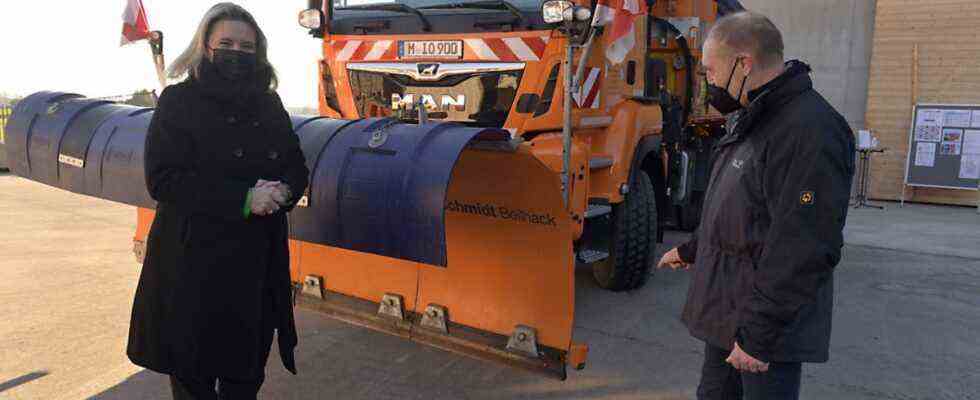When the roads are slick with snow, snow removal services are in high demand. Without them, many commuters would not be able to get to their place of work, children and young people would not be able to get to school, and the fire brigade and ambulance would not be able to get to the scene. But what use is the most modern clearing vehicle if the driver is sick in bed at home? Usually, this question occupies at most the heads of the road maintenance departments, who could order a replacement in the event of a few cases of illness. But not when a deadly virus is sweeping the country.
In view of the highly contagious omicron variant of the corona virus, the Bavarian Minister of State for Housing, Construction and Transport, Kerstin Schreyer, at the Sauerlach base of the Riem road maintenance department in the presence of press representatives, got an idea of how department head Frank Plate and his team were working in the ministry implement the developed hygiene concepts. They do that very well, “I think the road maintenance departments are doing an excellent job,” said Schreyer.
The ministerial protection concept is essentially based on avoiding contact between clearing drivers and thoroughly cleaning vehicles before they are handed over. “The employees no longer meet,” said Frank Plate. All rooms are separate, the kitchen and lounge are closed. Driving is in four shifts, each with four drivers. Those who are not on duty are not allowed to enter the road maintenance department. Last winter 2020/21 there were no corona-related failures in the winter service of the Bavarian State Building Administration among the around 2000 employees who are responsible for state and federal roads. “We are currently without any illnesses, toi, toi, toi,” said Frank Plate. To ensure that this remains the case this time and in view of the Omicron variant, work will be carried out in small teams and with a staggered start of service. “So far, the hygiene concepts have been very effective and we are doing everything we can to ensure that this remains the case in the future,” said Schreyer.
Perhaps Kerstin Schreyer also liked to play with small fire engines or trucks as a child, in any case she was impressed by the “high-tech stuff” whose function Plate explained: “The salt comes through the auger into the chimney and from there into the shaker.” , he explained the purpose of the equipment at the rear of the spreader vehicle. The driver mixes the amount of brine in the wet salt spread as he sees fit, depending on the soil conditions. Instead of loose grains of salt, liquid brine is applied to the roads, which adheres better to the road and its effect lasts longer. According to a press release from the ministry, salt consumption is significantly reduced while safety remains the same. Plate and his employees have already spread 800 tons of road salt on the 383 kilometers of roads and 105 kilometers of cycle paths this winter. 1700 tons are still in the salt hall in Sauerlach.
One should have more gratitude for the people who set off at three in the morning, said the minister during her visit to Sauerlach. In the cold and frequent snowstorms, the working day starts even earlier for one of these people. His designation is “scout”, every winter service manager has the opportunity to employ one, said Plate. For the scout, the night is already over at half past one. He is equipped with an I-Pad and his vehicle has a ground thermometer. According to Pate, when he arrives at the road maintenance depot, he already knows whether clearing vehicles need to be deployed. There are also six ice warning systems with camera sensors on the roads in the district, such as one on the steep, winding Grünwalder Berg, which the road maintenance departments have access to.
Schreyer therefore also positively received the decision of the Prime Ministers’ Conference to end the quarantine of infected people and contact persons after seven days if a negative test is presented. “In the event of a major onset of winter, we need every able-bodied employee to clear the federal and state roads of snow and ice,” said Minister Schreyer.

